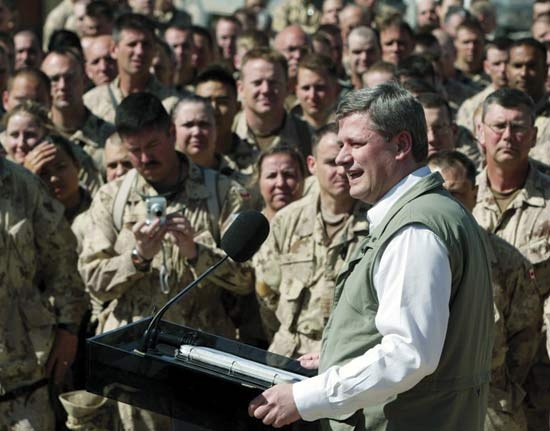Harper, Stephen
prime minister of Canada
in full Stephen Joseph Harper
born April 30, 1959, Toronto, Ontario, Canada
 Canadian politician, prime minister of Canada from 2006.
Canadian politician, prime minister of Canada from 2006.Harper was born in eastern Canada, where he spent his childhood. He attended the University of Calgary, where he received both a bachelor's degree (1985) and a master's degree (1991) in economics. Upon graduation he directed his career toward politics and public policy analysis. Harper was elected to represent the Calgary West riding in the Canadian House of Commons in 1993 as a member of the Reform Party, which had been founded in the 1980s to express both a distinctive role for the western provinces in the Canadian federation and conservative views on social policy. However, he chose not to seek reelection in 1997 after a disagreement with Reform leader Preston Manning. After leaving office, Harper led the National Citizens Coalition, which advocated free enterprise and lower taxes and was critical of the federal response to Quebec separatism.
In 2002 Harper was elected leader of the Canadian Alliance (the successor to the Reform Party), defeating its sitting leader Stockwell Day, and returned to Parliament later that year, as the MP for the Calgary Southwest riding and as leader of the opposition. In 2003 Harper engineered the merger of the Canadian Alliance with the centre-right Progressive Conservative Party (Progressive Conservative Party of Canada) to form the Conservative Party of Canada. In 2004 Harper was elected leader of the new party and attempted to define a moderate stance for the Conservatives, advocating tax relief, a balanced budget, and government transparency. He also endorsed conservative social policies that were at odds with many Canadians' beliefs. In the election of 2004 the Conservatives won 99 seats in the House of Commons, and Harper continued as leader of the opposition.
 In January 2006 the Conservatives won more than 36 percent of the national vote and captured 124 seats in the House of Commons, and Harper became prime minister of Canada, leading a minority government. He put forward an agenda based on four “pillars”: accountability, security, environmental protection, and strong economic management. His government emphasized lower taxes and debt reduction, and he narrowly won parliamentary support for an extension for the Canadian forces that had been deployed to Afghanistan following the September 11 attacks against the United States in 2001. In November 2006 Harper surprised even his supporters when he formally introduced a motion in the House of Commons to “recognize that the Québécois form a nation within a united Canada.” This largely symbolic motion, which passed, was designed to preempt a more extreme one planned by the separatist Bloc Québécois.
In January 2006 the Conservatives won more than 36 percent of the national vote and captured 124 seats in the House of Commons, and Harper became prime minister of Canada, leading a minority government. He put forward an agenda based on four “pillars”: accountability, security, environmental protection, and strong economic management. His government emphasized lower taxes and debt reduction, and he narrowly won parliamentary support for an extension for the Canadian forces that had been deployed to Afghanistan following the September 11 attacks against the United States in 2001. In November 2006 Harper surprised even his supporters when he formally introduced a motion in the House of Commons to “recognize that the Québécois form a nation within a united Canada.” This largely symbolic motion, which passed, was designed to preempt a more extreme one planned by the separatist Bloc Québécois.Despite Harper's earlier advocacy for environmental protection, in 2007 his administration officially distanced itself from the emissions targets outlined in the Kyoto Protocol, categorizing them as unattainable. The administration proposed the Clean Air Act, which set more ambiguous guidelines and a more generous time line for meeting emissions goals, as an alternative for dealing with climate change. The act drew harsh criticism from environmental groups and from the Liberal opposition.
Later that year, Harper ushered in a series of programs aimed at securing Canada's sovereignty over Arctic waters in an effort to ensure access to potential petroleum resources in the seabed. In 2008, under pressure resulting from rising casualties in Afghanistan, he introduced a successful motion setting a firm withdrawal date for Canadian troops. That year Harper also issued a formal apology for the treatment of indigenous peoples in residential schools. These schools, which opened in the 1870s, were designed to efface the cultural identity of indigenous children and forcibly assimilate them into broader Canadian society.
Having won the favour of many in Quebec by pushing the recognition of the Québécois as a nation, Harper hoped to make enough electoral gains in that province to establish a Conservative parliamentary majority, and he called a federal election for Oct. 14, 2008. Partly in response to worsening economic conditions in Canada precipitated by the crisis in the U.S. economy, voters in Quebec continued their support of the Bloc Québécois and the Liberal Party; nationwide, however, the Conservatives gained 19 seats to reach a total of 143. Harper had gambled by calling an early election, and, while his party was still short of a majority, he remained in power.
- Hukbalahap Rebellion
- hula
- Hulan
- Hula Valley
- Huldrych Zwingli
- Hull
- Hull, Albert Wallace
- Hull, Bobby
- Hull, Clark L.
- Hull, Cordell
- Hull House
- Hull, Isaac
- Hulls, Jonathan
- Hull, William
- Hulme, Keri
- Hulme, T.E.
- Hulse, Russell Alan
- Hulst, Hendrik Christoffel van de
- Hulun, Lake
- Humacao
- human aging
- human behaviour
- human being
- human body
- human cardiovascular system